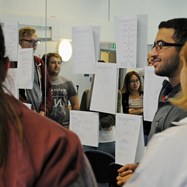Universities are critical partners in the fight to protect the NHS
13 February 2025
The Russell Group has called for universities to be a key partner in future planning for the NHS, to recognise and maximise their training and research contributions.
In a new briefing paper, Educating our future NHS workforce, the group of research-intensive universities has today re-iterated appeals for a cross-government health education taskforce and called for every Integrated Care Board (ICB) in England to have at least one representative from higher education.
Currently university representation on ICBs is rare, but the Russell Group says formally introducing universities into national and regional workforce planning would help identify barriers and create solutions for sustainable and long-term workforce growth.
Russell Group universities currently train three out of four UK doctors and dentists, and some are partnering with other organisations to establish medical schools in parts of the country experiencing a shortage of medical staff. However, the UK still lags behind other leading nations despite increasing need, with policy experts blaming patchy and unpredictable expansion plans in recent years that have prevented any meaningful forward-planning.
A lack of available placements is also a barrier. Hospitals, GP surgeries and community care struggle to provide enough capacity for students to gain crucial practical experience during their training. Many universities have responded by developing cutting-edge simulation units to provide students with the right skills and experiences, as well as sharing facilities where possible. Yet the Russell Group has warned that unless ineffective funding streams are addressed and pressure on primary care services is alleviated, the sector will not be able to support any significant increase in medical students.
The Russell Group has also highlighted the need to recruit more clinical educators and provide more robust support for this career path. Numbers have declined in recent years due to an ageing workforce and greater pressures on those who split their time between vital clinical research and essential teaching for the future generation of healthcare workers. Yet this pathway has become less desirable as researchers are discouraged from teaching responsibilities by workload pressures, financial concerns or the perception it will hinder their career development.
Professor Chris Day, Chair of the Russell Group and Vice-Chancellor of Newcastle University, said:
“Improving and future-proofing our national health service is a mammoth task. Government will need to draw on a wide range of expertise and innovations to make tangible change, so it’s critical that universities have a seat at the table.
“Our universities teach the doctors, dentists, nurses, technicians and other professionals the NHS relies on. Increasing this training capacity will be a vital piece of the puzzle in cutting NHS waiting lists going forward. Through translating advances in basic science into novel diagnostic, therapeutic and preventative strategies, the pipeline of clinical researchers we produce is also vital to ensuring the NHS remains at the cutting edge of healthcare and meets the UK’s current and future needs.
“We are ready to work alongside national and local government, university sector colleagues and NHS leadership to deploy our expertise and resources in the best ways possible. If we are supported and championed by government to get the most out of what we offer, the university sector will play a vital role in transforming our NHS for the better.”
Read the Russell Group’s new briefing, Educating our future NHS workforce.
Educating the future NHS workforce
Case studies
In 2023, King’s College London (KCL) entered a partnership with the University of Portsmouth to deliver a medical degree, expanding KCL’s graduate medicine course via a new branch campus that opened in autumn 2024. Portsmouth has higher than average levels of social deprivation, coupled with insufficient numbers of GPs, placing significant pressures on both primary and secondary care. This joint venture aims to improve recruitment into both general practice and other specialities, as well as bringing wider benefits to the local community. A similar partnership is taking place between the University of Nottingham and the University of Lincoln. The Lincoln Medical School currently delivers Nottingham’s medicine degree programmes to around 400 undergraduate students, encouraging graduates to complete their junior doctor training locally and stay in the region to serve one of England’s largest and most dispersed rural populations.
The University of Liverpool has invested more than £1 million in the new state-of-the-art Florence Nightingale and Rose Thompson Simulation Suites in its School of Allied Health Professions and Nursing. Highlights include a ward space for students to practice clinical skills in a simulated learning environment, sophisticated training mannequins, an interactive digital anatomy table, an x-ray and CT-scanner room that replicates those used in hospitals, and a model flat to simulate home visits and community assessments.
With an estimated 10,000 individuals having no access to a dentist in Cynon Valley in south Wales, in 2012 Cardiff University established a state-of-the-art primary care dental unit offering high-quality, free care from final-year dental students. Students benefit from critical practical experience of clinical and patient-facing skills, while expanding community dental services in an area of high need.
Notes:
- Russell Group universities train 3 out of 4 UK doctors and dentists, and around 18,000 midwives and nurses each year.
- Russell Group universities currently employ over 4,200 (FTE) clinical academics.
- The UK trains 13 medical graduates per 100,000 of the population, less than half of the leading nation - OECD data (2022).
-
Laura Peatman
laura.peatman@russellgroup.ac.uk
020 3816 1318
-
Jamie Roberts
Jamie.Roberts@russellgroup.ac.uk
020 3816 1309
 X
X

